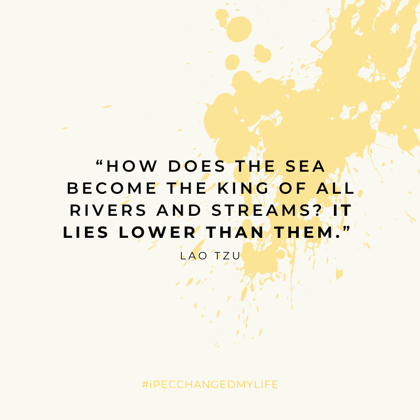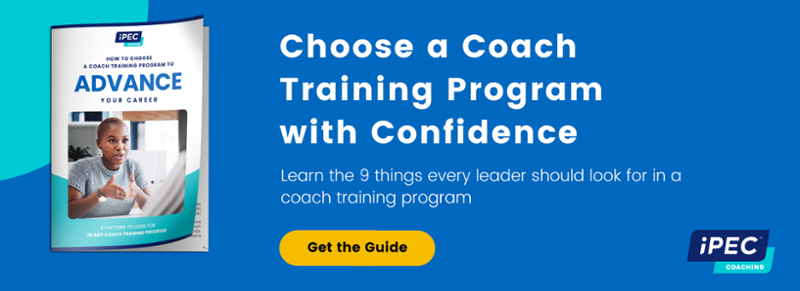Today's Workplaces Need More Inspiring Leaders. Here's One Way to Help.
by Anna Brunmayr, CPC, ACC, ELI-MP
Nov 20, 2019 | 5 minutes read
Major changes in the workplace are completely reshaping the way we work, what we want out of our jobs, and how we need our inspiring leaders to manage. Many of these changes are exciting:
- more opportunities for remote work
- increasingly flexible schedules to build work-life balance
- an increase in unlimited vacation days.
But one of the most significant shifts we’re seeing is in the increased demand for EQ and people skills.
Workplaces are becoming more respectful, co-creative, and dynamic energy-conscious places where people skills have importance. Yet, as the landscape of traditional work erodes before our eyes, we’re developing a new type of workplace that no one was trained to understand or succeed in. For decades, traits like communication, teamwork, adaptability, creativity, and interpersonal skills were undervalued and seen as “soft skills”—but in the 21st century, these skills are becoming just as important to organizations as professional credentials, training, and degrees.
Leaders and executives are affected by these changes more than anyone else. It can be confusing and overwhelming trying to figure out the new demands on leadership, and many are urgently seeking guidance to learn to lead well within the new workplace paradigm.
In this new era, corporate and executive coaches have a huge opportunity to be at the forefront of this workplace evolution and affect meaningful, lasting change.
By choosing to pursue a fulfilling career as a corporate, business, or executive coach, you could not only be engaged in personally meaningful work, but also pave the way for a new kind of leadership to take hold.
With the support of a well-trained executive coach, leaders have the opportunity to bring out the best in themselves, authentically build trust and motivation across their teams, and connect with everyone around them in an empowering way—which leads to a more positive, enjoyable workplace environment everyone can enjoy (in addition to higher-performing teams and a stronger bottom line).
You’ll also help your clients accelerate performance with less stress—a groundbreaking reward the old paradigm rarely delivered.
Why the Workplace Needs Inspiring Leaders Now More Than Ever
Leaders and companies want to change their approach to management now for several key reasons:
- Generation Z is entering the workforce and bringing new expectations, like mental health awareness in the workplace, to the table.
- People-oriented skills like a good attitude, creative problem-solving, and curiosity are becoming more valuable than ever, as technology advancements shift workplace demands.
- Millennials have shifted workplace culture and attitudes with their preference for engaged managers who take time for collaborative, ongoing goal-setting and prefer more partner-like relationships as opposed to feeling disconnected from management.
These factors, combined with many more, demonstrate the need for more thoughtful and authentic leaders.
In this new paradigm, leaders who can communicate, build respect, and earn trust with diverse groups of people and in a broad range of new situations have the greatest chance of seeing their teams reach their full potential.
Before, a manager, CEO, or company president was expected to autocratically set priorities, identify ways to push toward progress, and mechanically delegate tasks to a team that worked together day in and day out. Today’s leaders must connect with people who work flexible schedules and need more collaboration to feel engaged.
They must inspire their teams to feel passionate about their work and tie it to something more meaningful than a checklist. They must become people-oriented leaders, listening, asking, and surrendering—values that are largely contrary to what many leaders have been trained to focus on in their roles.
An Executive Coach offers a proverbial life raft to executives struggling to keep up with these evolving demands and expectations that have taken holdover the last ten years, by acting as a guide—giving them the tools they need to understand themselves and others in new ways and asking questions to help them find the answers and insights within themselves.
When you partner with clients, you’ll be able to introduce a new feeling of understanding, empowerment, and relief into their lives. You’ll be able to help them understand that as the energy in the workplace changes, and we shift into a more conscious-based work model, the best way for them to experience the positive growth and results that they crave is to learn to examine and reflect on the energy that they, themselves bring to their environment.
With the expert guidance of an executive coach, leaders can feel fully empowered to positively shift their management style, boost morale, and achieve better results—all of which go a long way towards affecting positive culture changes at work.
What Happens When Leaders Don’t Adapt To The People-Centered Workplace
Today, almost one out of three employees doesn’t trust their manager. When there’s a lack of trust in the workplace, employees begin to disengage and lose self-esteem, initiative, and passion for the outcome of their work.
Burnout is another growing workplace trend, which has been classified by the World Health Organization as a real medical diagnosis. The WHO defines burnout as, “a syndrome conceptualized as resulting from chronic workplace stress that has not been successfully managed.” When ignored, burnout drives absences (stress and burnout drive nearly 60% of absences), resignations, and costs businesses somewhere between $150 to $350 billion annually according to top experts.
When executives don’t adapt an empowered approach to leadership, these are only two of the major consequences that can manifest. Previously, the adage was to lead with control and fear—to make yourself look like the most tough and powerful person in the room. To never look weak and never be taken advantage of.
But as the workplace evolves, we’re discovering that openness and empowerment, kindness, and compassion are much more effective motivators for employees.
To really thrive today, leaders have to be willing to think about their role at work differently.
And as an Executive Coach, you can help them reexamine the type of presence they want to bring into their workplace and teach them how the energy that they project will influence the response they get back from their teams. You’ll facilitate their growth as an inspiring leader, from someone who leads with intimidation to someone who increases meaningful connections across teams and creates a more positive and productive work environment that everyone can enjoy.
How Executive Coaches Help Leaders Understand the People-Centered Workplace
While there are many areas where an Executive Coach can support clients, you’re in a special place to help leaders understand the needs of a people-centered workplace. As an iPEC Certified Professional Coach, you’ll have the credentials and the comprehensive training to earn the trust of your corporate clients out the gate.
Executives need a trusted business partner who they can see as an equal to help them illuminate truths that they’ve suspected, but couldn’t completely articulate, visualize, or understand on their own. They’re often looking for someone who takes success and results as seriously as they do, and with your training, you’ll be able to walk them through proven systems that have transformed the lives (and performance outcomes) of many leaders before them.
By creating a space where your executive clients feel safe and comfortable enough with you to let their guard down and be open to see their world, their work, and themselves from a new perspective, your work as an executive coach can be a catalyst for lasting, far-reaching change.
 With the growing demand for improved human connection, meaning, and responsibility for the wellbeing of others, your role as an Executive Coach is to help the struggling leader get in touch with the best part of themselves so that they can bring out the best in each of their team members and in all of their work.
With the growing demand for improved human connection, meaning, and responsibility for the wellbeing of others, your role as an Executive Coach is to help the struggling leader get in touch with the best part of themselves so that they can bring out the best in each of their team members and in all of their work.
The way we work and do business is changing. Rapidly. In big and small ways. And the most successful organizations understand that their leadership has to adapt a new approach to management and relationships to create cohesive, streamlined workplaces.
Many companies see this but don’t know how to change.
Making these shifts requires a leader to be patient and humble. A sense of humor helps. But more than anything, having a supportive guide to walk you through the process is the fastest and surest path to success.
Your iPEC training will teach you to develop authentic executives who lead with their values and connect deeply with others, bringing the human element back into work and back into the leadership lexicon. By meeting leaders where they are, and by introducing incremental change, you’ll be able to create maximum impact.
Being a leader no longer means being the ruthless King of the Jungle. Lao Tzu sums up the heart-centered workplace best, “How does the sea become the king of all rivers and streams? It lies lower than them.”
Discover how coach training help you advance your career
Download the guide and learn how to choose the right training program for you.


